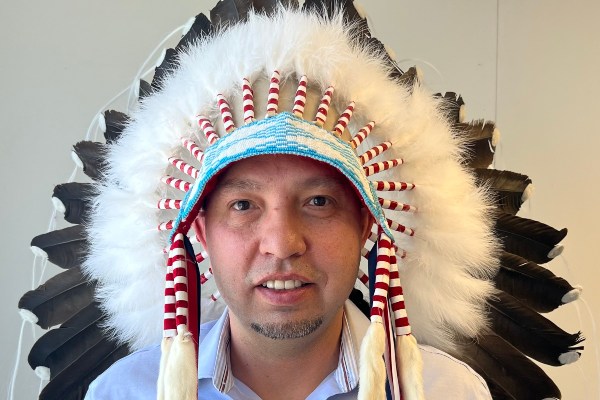
Respect, leadership, and learning the ins and outs of public service
Robert St. Denis' desire for an Online Master of Public Administration (MPA) came from wanting to better understand the public service system to help his home community.
By Matt Olson for JSGSRobert St. Denis’s day-to-day work has connected him with public servants on a regular basis.
So when he had the opportunity to better understand the systems he was working with, he seized his chance.
“As a First Nations person, I was guessing and speculating what was happening in the policy cycle within the public sector,” he said. “I wanted to dive in and learn more.”
St. Denis is a graduate of the Johnson Shoyama Graduate School of Public Policy (JSGS), earning his MPA online in 23 months.
It wasn’t always easy for St. Denis, who held down a full-time job while earning his MPA — and he’s grateful to those who supported him through the process.
“I was lucky to have a supportive family. They sacrificed their time to let me focus on the program,” he said. “My employer was incredibly supportive as well, knowing that my greatest intellectual focus was on academics.”
St. Denis describes himself as a program manager for Community Futures Treaty Seven (CFT7), a Calgary-based organization dedicated to economic development and labour training opportunities for Treaty 7 First Nations.
As St. Denis puts it, he works with various First Nations communities to help connect individuals to the labour market. CFT7 receives funding from the federal Indigenous Skills and Employment Training (ISET) program, and part of St. Denis’ work is to identify additional funding streams and help develop programs to train and set up Indigenous individuals for success in the job market.
While he didn’t enter into the MPA program to become a public servant himself, St. Denis said the idea of better understanding the driving forces behind the people and the public policy framework he operates in drew him to JSGS.
“In Canada in general, there’s a lot of guessing as far as exactly what happens in a public service. So to improve living conditions, economic conditions, employment conditions for Indigenous people, I thought the program would help give me some of the tools to help contribute to improving the lives of Indigenous people,” St. Denis said.
The desire to help improve the community has long been the main driving force for St. Denis. He wasn’t born in Treaty 7 — he’s originally from Beardy's & Okemasis' Cree Nation — but he’s been living in Calgary since 1998.
Recently, St. Denis said elders, Roy Weaselfat, Calvin Williams and Clarence Wolfleg recognized him with a headdress as an acknowledgement of his work in Treaty 7. Receiving that honour and earning his MPA almost simultaneously were huge achievements for him — one in appreciation for his contributions in the community, and the other to help him continue that good work.
“I’d like to think, to hope, that completing the Master’s program helped me improve as a leader,” he said.
Though St. Denis said keeping up with the program while working full-time was challenging, he also highlighted parts of the MPA that kept him engaged and interested throughout the process.
St. Denis credited the “high-energy” faculty for being very informative and supportive during the learning process, and lauded the amount of Indigenous content that professors introduced into the courses.
“It’s not an Indigenous-based program, but talking about policy, there was always some type of Indigenous inclusion. That was huge for me. That helped me stay engaged in the course content,” he said.
One of the challenges to taking programs online can be a feeling of isolation from your classmates and your instructors. Though St. Denis said that was a concern for him, he added the connections he made with his MPA cohort quickly squashed any worries.
St. Denis said building relationships working digitally, like any relationship, takes time. But through group projects, participating in virtual course discussions, and opportunities outside of the classroom, he expressed gratitude for being able to foster a strong connection with the rest of his cohort.
“I don’t think I would have made it through the two years if I didn’t have a trusting relationship with some of the other students,” St. Denis said. “As far as schoolwork goes, it might feel like you are not accomplishing anything during the project meetings… but what you are accomplishing in those extra conversations is a level of trust and bonding with your schoolmates.”
It was a long and tiring process, but the result was well worth the effort for St. Denis. At his graduation ceremony in his old hometown of Saskatoon, he was able to have family and friends in attendance.
And for the ones who supported him to get to see him — the only Indigenous person he knew of in his cohort — walk across the stage to get his degree, it was a “surreal” moment St. Denis said he won’t soon forget.
“Part of the motivation was to have my kids there to see the convocation, and to inspire them, to help them believe and see it’s something they can do, if they want to do it,” he said. “It was a really proud moment … for all of us.”

